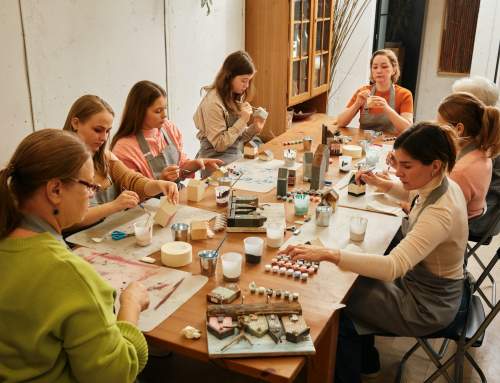Do you feel nervous about finding a new job? You’re not alone.
According to a survey by Hired of 2,500 workers across Australia, the UK and USA, 8 out of 10 working adults said finding a new job is stressful (more stressful than visiting the dentist!).
Stress caused by job hunting is often caused by the unknowns:
- Not knowing if the new job will be a better fit.
- The uncertainty of knowing if you’ll get the job.
- Wondering how you will perform during the recruitment process.
- Preparing for rejection.
All of these unknowns can arise from fear, and in particular, a fear of change.
The Hired survey also revealed that 44 percent of people day dream about leaving their job on a monthly basis but only 14 percent actively look for a new job.
So why do people day dream about finding happiness in their career but then do nothing about it?
Sabotage by The Inner Critic
Each person has their own inner-critic and for some, their critical voice speaks so loudly it holds them back from pursuing their goals.
In my blog “Tame Your Inner Critic”, I examine the nine different saboteurs who hold us back from finding happiness in our careers and lives.
Two of these saboteurs are:
- The avoider – why bother looking for a new job? I won’t find something I love anyway.
- The hyper-achiever – I can’t risk failure how will I look to others?
I had one client who, despite being unhappy in her role, was scared to look for a new job because her inner critic told her “I will disappoint them” and “I’m not good enough to find another job”.
Listening too closely to your inner-critic will keep you hostage in a job you don’t enjoy and can diminish your self-belief that you can do better.
(Re) Gaining Self Confidence
Sometimes looking for a new job is a choice. Other times, it’s not. You may have taken time off work due to illness, parental leave or perhaps you were made redundant. It doesn’t matter the reason why, it can be a big blow to your self-confidence and leave you questioning your self-worth a competitive job market. You might also be worried about how you to explain your absence to a potential employer. In this frame of mind, it can be difficult to find the confidence and motivation you need to search for a new job.
I remember when I quit my job and then took months to decide on what to do next. I knew what I didn’t want to do BUT did not know what I wanted to do. This period made me question my self-worth and my identity, which I had tied to my job. It really knocked my self-confidence. Now, each time I meet with a client who has been out of work, I recall that feeling. No-one is immune, not even the career coach. It’s not the knock downs in the career that define you – the important thing is how you recover. And beating yourself up if you’re already feeling flat won’t help you shift gear into job-search mode.
Here are three things that I did to rebuild my confidence and shift my mindset. These three steps helped me start my own business as a career coach.
1. Challenge the Critic
The antidote to the inner-critic is the sage – our true nature, the one we knew as a child, who believes we are capable, creative and wants us to thrive. The key is knowing how to tune out from the critic and connect with your sage.
The sage knows that every outcome or circumstance can be turned into opportunity, even those you might consider failures.
I know it can be difficult but when I challenge my inner-critic (which is often), I ask myself “what is the worst thing that can happen?”. When I look at the situation logically, the worst outcomes are more imaginary than real. It is better for me to try and fail than do nothing. At least I can be satisfied I gave myself a shot.
Another way I tackle my inner critic is to write a list of my fears. I then rate each one out of five. Next, I ask myself: “Are any of the outcomes life-threatening?” “If one of these outcomes eventuates, could I bounce back?”
It can be easy to personalise rejection, especially if your self-confidence is low. But nobody wins every time. If you get a knock back, try not to catastrophise it. There is always, the next opportunity which might actually be a better opportunity for you.
2. Cultivate a Growth Mindset
In my blog What Mindset Are You? I talk about how to cultivate a growth mindset. A growth mindset is a way of approaching your career (and your life) that recognises you are constantly learning and growing your mind and capabilities.
Psychologist and researcher, Carol Dweck, recommends if you don’t succeed at first, rather than label yourself a failure, think “I’m not there yet but I’m learning”.
“If you get a fail, you’re nowhere, but if you get a ‘not yet’ you’re on a learning curve – it gives you a path into the future,” said Ms Dweck.
A growth mindset is cultivated by looking at everything you do as part of a broader, longer life learning journey rather rating yourself as a “success” or “failure” every time you participate in life’s activities.
3. Ask for Help
If you feel stuck in a rut, it’s a good idea to talk to others you trust about your feelings.
In her TED Talk, How to Make Stress Your Friend, psychologist Kelly McGonigal says seeking help from others helps relieve your stress.
“Oxytocin is the body’s natural stress defence. One of oxytocin’s main roles in your body is to protect your cardiovascular system from the effects of stress. It’s a natural anti-inflammatory. The physical benefits of oxytocin are enhanced by social contact and social support. I find this amazing that your stress response has a built-in mechanism for stress resilience, and that mechanism is human connection,” said Ms. McGonigal.
If you can’t talk to family and friends about your situation, consider talking to a professional. An independent career coach can talk to you about finding a career to suit your strengths and personality, give you practical advice on your resume and interview techniques but most importantly, provide emotional support to bolster your resilience.
If you’re feeling nervous about finding a new job, talk to me about the challenges you face and let me help you find a satisfying career.
For more advice on how to beat the job-hunt jitters:
Watch:
Read:
If your work is causing you stress and anxiety that is impacting on your immediate well-being, then we encourage you to ring the Beyondblue Support Services on 1300 22 4636.







